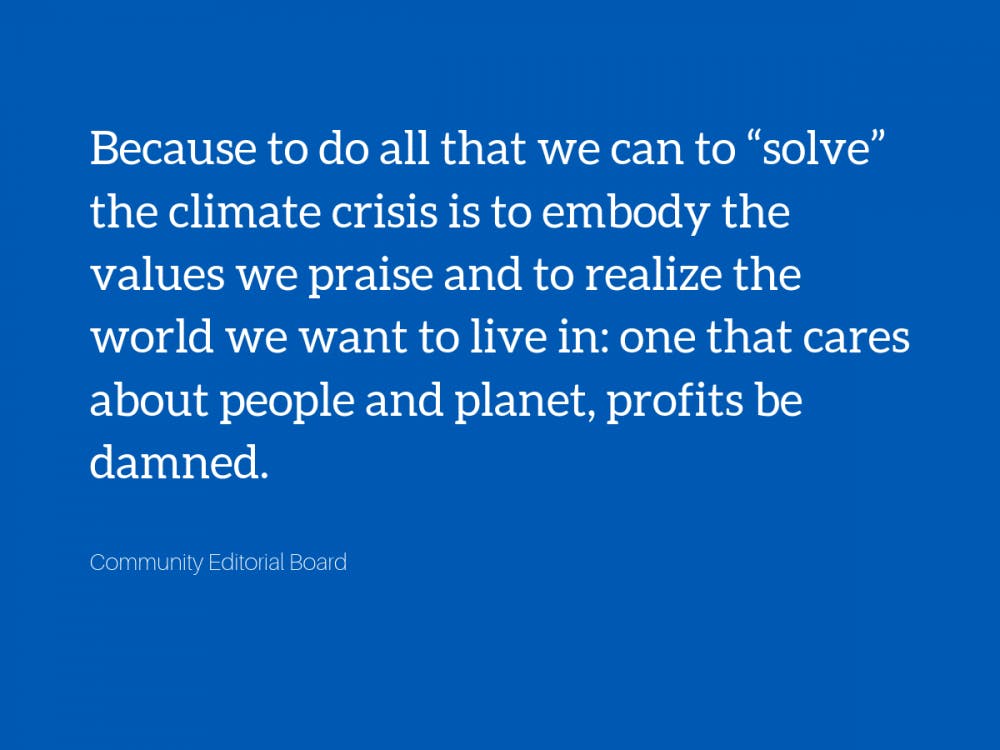The average Duke student might look to enjoy some sun and Beyú Blue coffee on the Bryan Center Plaza this Saturday. However, they may not be aware of the climate strike that will be happening, with just 128 individuals—less than 1% of all Duke students—“interested” in the Facebook event as of the beginning of this week. This strike coincides with the climate strike in Raleigh on Friday as part of a global climate strike. Demanding the end of fossil fuel use, the movement has been led by youth like Greta Thunberg, the 16-year-old activist who has skipped school every Friday for more than a year to demonstrate outside the Swedish parliament and the White House last week.
Perhaps it’s not surprising how little energy the climate strikes have garnered at Duke. This is evidenced by how some students comfortably host hurricane parties and don’t question how workers dutifully clear our sidewalks in the wake of a mere inch of snow. Meanwhile, the millions of people most affected by the climate crisis—who are disproportionately low-income, racial minorities and indigenous—have suffocated from wildfires across California, the Amazon and Madagascar; been swamped by sea level rise in the Marshall Islands, Jakarta and Dar es Salaam; and been hammered by increasingly severe hurricanes in Puerto Rico, the Bahamas and the NC Outer Banks. For others who do care, there seems to be a tendency toward the nihilistic intellectualization of traumatic disasters alongside the celebration of superficially impactful vegetarianism, metal straws and weekly recycling. However, this nihilism, those individual actions, are privileges, and they still bear complicity in the suffocation, dislocation and ruination of others by this crisis.
Thus far, demanding individual and institutional accountability has made little headway in solving the climate crisis. While we may highlight Duke’s feeble and opaque divestment efforts or environmentally dubious interest in biogas and even push Duke to shut down its plans for a natural gas power plant, the University, so it seems, remains preoccupied with profit first and the planet second.
Around the country, wealthy elites behave similarly, regarding freshwater scarcity as an investment opportunity or buying personal securities like Kim Kardashian’s private firefighters or Oprah’s private roads. In each of these instances, elite individuals and institutions tend to make decisions based on private profit, efficiency and/or cost-benefit “pragmatism”—neoliberal, late-capitalist logics that are directly antithetical to environmental sustainability.
Admittedly, it's hard to shed cost-benefit frameworks and act purely on morality—just as it’s hard to swim against the neoliberal cultural tide at Duke of seamless control and perfection. But how do we stop swimming with the tide? How do we act for the environment without regard for the price tag? We must recognize that it is no longer sufficient to demand accountability for wrongdoing as a reaction. Rather, we must proactively work toward an environmentally sustainable economic system that operates with an aligning set of moral obligations for the planet and for all, not just the upper echelon. This includes understanding and deconstructing how we participate in maintaining that system. As students who will cycle out of the University and carry its benefits with us, we ought to recognize our potential power as a collective and come together to demand that Duke invest in public transportation, native plants, clean energy technology or alternatives to our exorbitant and water-consumptive grass like mulch or synthetic lawn.
The actions we take or don’t take, whether they feel intentional, are guided by choices that we have control over. With the current climate catastrophe and the trauma it has already inflicted on millions around the world, we can no longer afford to choose inaction. No matter whether we resign ourselves to fatalism or salvage hope in preservation, we must live up to our own critiques of those with institutional power, shedding our individualism in favor of collective action. We can educate ourselves on environmental (in)justice, participate in advocacy like the Sunrise Movement, disobediently demand larger shifts toward community land ownership and cooperative labor, or attend the climate protests. Because to do all that we can to “solve” the climate crisis is to embody the values we praise and realize the world we want to live in: one that cares about people and planet, profits be damned.
Get The Chronicle straight to your inbox
Sign up for our weekly newsletter. Cancel at any time.

